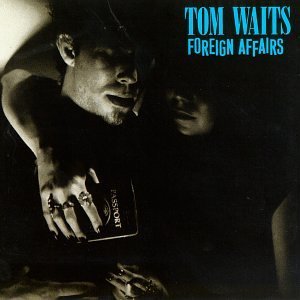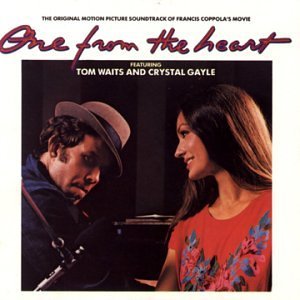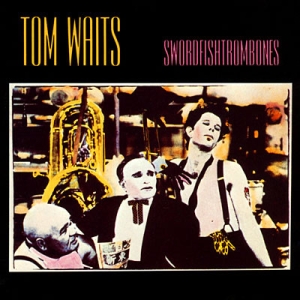Although really none of Waits's albums would ever be considered a proper commercial breakthrough, would never yield him that big hit single or that track that took him into the households of the world and made him known to all, he has quietly over the years insinuated himself into a position almost of music god. So many musicians quote, cite, cover or are influenced by him that it's tempting to think that he was around forever. But though mainstream success eluded him --- I don't really think he bothered courting it, to be honest --- his albums over a period from 1976 to 1987 just got better and better, and this is what I would consider his golden period. That's not to say that albums following that were poor, but as he stretched out in new directions and tried new things, albums like
Bone machine, The black rider, Alice and
Blood money just seemed to lack something, be a little less accessible. This, however, remains one of his crowning achievements for me. But then, so does the next. And the next...
 Blue Valentine --- 1978 --- Asylum
Blue Valentine --- 1978 --- Asylum
One thing you always got from Waits, at least around this time, was pure frank honesty on the cover of his albums. He didn't go for showy, glitzy or abstract album covers: it was usually just a picture of him, but the picture almost always portrayed a particular aspect of him, or referenced the state of mind or body he was in at the time. “Closing time” shows him leaning against a piano, alone, perhaps a little daunted on his first outing but still with a confident swagger and a gleam in his eye, while on the cover of “Small change” he's addressing his rampant alcoholism and destructive lifestyle, looking away as if to say “What the fu
ck am I doing here?” On the front of this album we find him in reflective mood, perhaps thinking about lost lovers, his career or his attempts to stop drinking before it killed him. You can almost see into his heart, which is appropriate given the title, and there's a world-weariness and almost a sense of resignation in his nearly-closed eyes; you can nearly hear him sighing.
But if you thought the album was going to be a contractual obligation, by-the-numbers effort that he really wasn't interested in, then you really don't know Tom Waits. The album contains some of his most cynical songs alongside some of his most beautiful ballads, and is almost a marriage of Heaven and Hell as he goes once again searching through the alleyways of society after dark, poking through the refuse to reveal the human detritus, the spent men and fallen women, the whores and the drunks and the barkers and the con-men, and telling their stories.
Proving once again that you must expect the unexpected with Waits, the album opens on a cover of the famous “Somewhere” from the musical
West Side Story, Waits giving it his own special ragged touch as he growls his way through the love ballad, supported by the return of Bob Alcivar's sumptuous orchestra. It's completely out of left-field, something he has never done before and something I don't think he ever repeated, and it sets the tone for the album. Almost like "Thunder Road" o n Bruce's
Born to run, it's the only optimistic song on the album, which then descends into a litany of hooker, pimps, eloping kids and spree killers as, if you like, Waits leaves the movie theatre and shuffles back out onto the hard cold streets of reality, turning his collar up against the rain, back in the world he knows.
The song is followed by “Red shoes by the drugstore”, which rides on a boppy, upbeat percussion with sort of sprinkled guitar flying through it, almost like a tribal dance or something. Typical again of Waits, there's no real structure to the song, no verse/chorus/verse; it just sort of runs as an almost stream-of-consciousness lyric yet with a definite form. Having eschewed guitar completely from his previous album Waits perhaps overcompensates this time out, bringing in three more apart from himself, giving the album a fuller sound.
One of his alltime classics is up next, the heartbreaking ballad “Christmas card from a hooker in Minneapolis”, as a woman writes to her ex-lover to tell him how well her life is working out these days.
”Stopped taking dope/ Quit drinking whiskey/ My old man plays the trombone/ Works out at the track.” It's a solo performance by Waits on the piano, a slow, bluesy melody, but in the end the woman comes clean:
”Charlie, for God's sake/ You wanna know the truth of it?/ Don't have no husband/ He don't play the trombone/ Need to borrow money...” It also contains one of my favourite lines written by Waits:
”Everyone I used to know/ Is either dead or in prison.”
I feel the jazz elements are lessened here too, as he proceeds into a straighter blues rock direction, particularly on the next two tracks, starting with “Romeo is bleeding”, with a certain latin swing to it and a feel of, again, the gangs from
West Side Story with finger clicking and congas, the vocal a low hiss, almost as if Waits is afraid to be heard, maybe hiding from the gangs. Some great organ on this for which we owe thanks to Charles Kynard, as Waits tells the story of the gang leader who listens to the police sirens but
”just laughs, cos all the racket in the world/ Ain't gonna save that copper's ass/ He ain't never gonna see another summer/ For cuttin' down my brother/ And leavin' him like a dog behind that car without his knife.”. Romeo has been shot but doesn't seem to care, or even notice, hard as nails and probably realising he's dying but glad that he has extracted retribution for his brother.
For the second time Waits records a song over eight minutes, and it's a belter as he really sinks his teeth into the blues for “29$”, another of my favourites on this album. With Kynard again at the helm and Waits himself in fine form on the piano, featuring some stupendously righteous blues guitar the song again follows a broken-down resident of the night city as he tells her
”Little black girl/ You shoulda never left home/ There's probably someone that's/ Still waiting up for you.” and true to his fears the girl is hustled, robbed and ends up in hospital where the doctor shakes his head and groans
”Lucky to be alive/ Only lost half a pint of blood/ Twenty-nine dollars/ And an alligator purse.” Some truly superb blues playing here makes the song seem nowhere as long as it is, and you could listen to it for twice the length. It's a great cautionary tale, again jumping back to “Burma-shave” and showing that the grass is not always greener, that sometimes it's better to stay at home where you're safe.
You might think after a powerhouse performance like that, the aqlbum would begin to dip a little in quality, and to be fair, this might be the case with lesser artistes, but Waits has his foot on the throttle here and he ain't braking for no red light! There are five songs to come and each is as good as, if not better than the other. “Wrong side of the road” takes as its protagonist a couple eloping, with a blues shuffle and again exquisite organ work from Charles Kynard as the man encourages the woman to come with him against her parent's wishes, to run away with him to Reno. It's a slow blues meander as he snarls
”Tell your momma and your poppa/ They can kiss your ass/ Poison all the water/ In the wishing well.” This guy also does not have the Christmas spirit in his heart, as he sneers
"Strangle all the Christmas carollers/ Scratch out all their prayers/ Tie 'em up with barbed wire/ And push 'em down the stairs.”
As he convinces her to leave her house and head off with him his intentions take on a much darker tone when he promises
"With my double-barrelled shotgun/ And a whole box of shells/ We'll celebrate the Fourth of July/ We'll do a hundred miles an hour/ Spendin' someone else's dough/ Drive all the way to Reno/ On the wrong side of the road.” The tempo kicks up then for the infectious “Whistlin' past the graveyard” in which Waits lays the urban legend down that he was
”Born in a taxi cab”. There's a bit more of the jazz about this one, with trumpets and saxes taking the tune and bouncing it along like Waits as he goes
”Whistlin' past the graveyard/ Steppin' on no crack.” The next song again I've written extensively on, so let me just say that “Kentucky Avenue” is a piano ballad that seems at first to be a story of two kids making plans for their day, until right at the end you realise one is handicapped, as Waits sings, in one of his most emotional vocals,
”Take the spokes from your wheelchair/ And a magpie's wing/ I'll steal a hacksaw from my dad/ Cut the braces off your legs.” It's a song that always makes me cry, and I don't care who knows it. A fragile, viciously beautiful and bitter, heart-smashing ballad that nobody else but Waits could write. The orchestra coming in at the revelation in the lyric just increases the pathos and tragedy of the song. My eyes are wet even now, and that's how it should be with a song such as this.
Then we're in the seedy hotels that he has frequented no doubt on more than one occasion for “A sweet little bullet from a pretty blue gun”, somewhat of a return to the rhythm of “Romeo is bleeding”, and with Waits again plundering childhood tunes as he opens with
”It's raining, it's pouring” and later
”Old man is snoring/ Now I lay me down to sleep/ Hear the sirens in the street/ All my dreams are made of chrome/ Have no way to get back home/ And I'd rather die before I wake/ Like Marilyn Monroe.” The guitars play a great part in this, as does the sax, and it just oozes trashy sexuality and questionable morals as it slinks along the alleyways. At its heart, it's a song that looks back to “29$” and describes the plight of the many thousands of young girls who leave home looking for fame, to be discovered, and end up peddling their bodies, the only thing left that they can sell, on the hard city streets.
The title track closes the album, and it's another bitter ballad, with the addition of an “s” to the end, making it “Blue Valentines”, as the album cover becomes the song, Waits recalling the cards he gets from his ex-lover in Philly
"To mark the anniversary/ Of someone that I used to be/ And it feels like there's/ A warrant out for my arrest.” Reflective guitar carries the song almost on its own, no percussion, no sax, no piano, a true triumph, an indication of what can be done with just one instrument. Okay, it's probably a few guitars, but nothing else that I can hear. The song also references his drinking days and what it has done to him as he moans
"It takes a whole lot of whiskey/ To make these nightmares go away/ And I cut my bleedin' heart out every night.”
TRACKLISTING
1. Somewhere
2. Red shoes by the drugstore
3. Christmas card from a hooker in Minneapolis
4. Romeo is bleeding
5. 29$
6. Wrong side of the road
7. Whistlin' past the graveyard
8. Kentucky Avenue
9. A sweet little bullet from a pretty blue gun
10. Blue Valentines
At this point, I feel there just was no stopping Waits. Having created a masterpiece like “Blue Valentine” you would have forgiven him for taking a rest, but no: it only took two more years before he would release yet another incredible album. If nothing else though, this showed his refusal to be categorised, boxed up, restricted. On “Small change” he had gone in all directions, making it impossible both to pin him down and to know or be able to guess where he would jump next. For “Foreign Affairs” he went all film-noir and bluesy, and now he was throwing blues and jazz together and adding in some other elements, but continuing to talk and tell the stories of the dispossessed, the pathetic, the drunk and the abused, and to send some half-drunk warnings to those who wanted or wished to join the dark world, tread the grey, unforgiving streets he walked.
If you want to make it out here, you had better man (or woman) up and grow yourself a real thick hide, cos this ain't no place for the weak. You'll be chewed up and spat out by the system, and the only way to avoid that is to do some chewin' and spittin' yourself. You wanna take a walk on the wild side, you better have the bus fare, cos this wagon ain't stoppin' any time soon, and once you're on board you're there for the long haul.
So look into my eyes, kid, he says, chewing down on a cigar and knocking back a whiskey, his bloodshot eyes trying to make out which of the two of you he's taking to, and tell me you got what it takes to make it on these mean streets, And if not, then stay at home with your parents and your college degree and your dog and your summer job, cos you wouldn't last pissin' time. It's not nice out here.











 Linear Mode
Linear Mode
